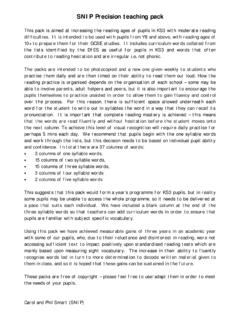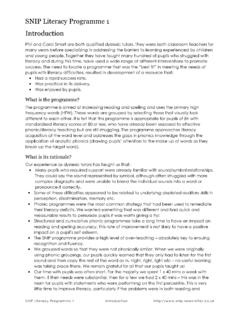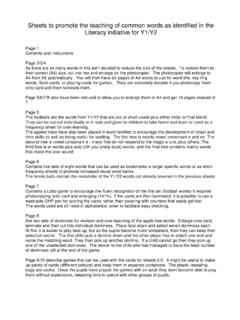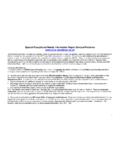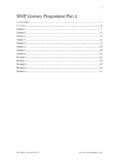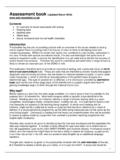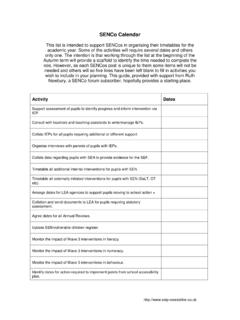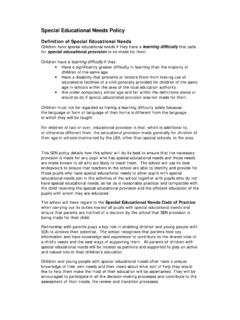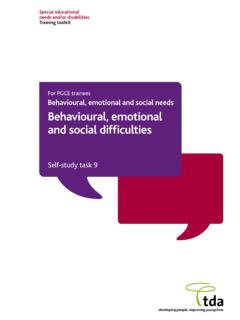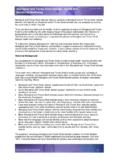Transcription of SNIP KS2 Social and Emotional Skills - snip …
1 Rationale for planning of SNIP KS2 Social and Emotional Skills Programme This planning was originally completed for a group of mixed aged KS2 children who attended for one afternoon session a week. The pupils had Social and Emotional difficulties resulting from lack of opportunity, attachment difficulties or inadequate Social experience. Their level of Emotional and Social competency was identified by the Boxall Profile*. The programme was delivered by two teaching assistants in a nurturing environment that was home-like with soft seating and play/work areas.
2 To produce and provide a framework for the intervention, a section from the QCA document Supporting School Improvement: Emotional and Behavioural Development was used that targeted Emotional behaviours. This can be downloaded from The programme includes: Listening Skills and motor integration. Although research shows the importance of listening in establishing school success, it is often not deliberately taught in the mainstream classroom. The attainment of this skill is focused upon in the programme.
3 Motor integration is a feature of many interventions and is thought to promote learning by enhancing the brains ability to multi-task. The rate of progress through the motor integration programme must be guided by the group s ability it is therefore likely that many groups will need to spend sessions repeating and rehearsing sessions and not progress as quickly as may be suggested here. It is important that the SaES programme is fitted to groups needs rather than the other way around. Circle Time in order to enhance listening, co-operation and to support the development of empathy towards others.
4 Teaching focused upon increasing ability in the specific aim identified from the QCA audit. Research indicates that many pupils with Emotional delay are unable to absorb information incidentally but must be deliberately taught these deficit Skills . Healthy eating. All snacks must conform to healthy eating guidelines low sugar, few additives and encourage experience of different textures and tastes. It is important to check for any recorded pupil allergies or intolerances before introducing food to pupils.
5 If toast is chosen, provide a mixture of savoury and sweet toppings marmite, good quality jam, honey. Introduce fruits and raw vegetables. No one should be forced to eat anything but do not habitually provide substitutes. Sharing food is an important aspect of the SaES programme. Promotion of vocabulary extension to enhance ability to cope with the curriculum but places particular attention on Emotional vocabulary. Promotion of the use of art/drama/music and movement to increase active and participatory learning opportunities and experiences.
6 In addition: All activities should be snappy to retain interest and attention, although there should be thinking time to reflect upon learning. Any spare time can be usefully spent in imaginative play, so providing dressing-up clothes, masks, play shops and play homes is important. As far as possible all activities must be supported by active interaction with adults, who will work towards extending play and making suggestions to enhance the learning experiences. Staffing. The provided environment has unconditional valuing and respect for all at its centre, so careful selection of suitable staff is vital.
7 You are seeking for a child-centred Mrs Softallover who is able to develop a relationship of trust and empathy with pupils who may often test them. Put-downs, public control by intimidation are totally rejected. Boundaries must be agreed by all and kept to, but worked towards by explanation, demonstration and reason often there is no time for this individual approach in the classroom. It is important to remember that many of these children are working at an Emotional age possibly two thirds of their chronological age, so staff must respond to them at the level that they are at.
8 Conflict should be avoided but when it occurs, techniques useful for younger children such as distraction, should be implemented to manage situations. Staff will need time to reflect upon strategies that result in the most positive outcome for all and for reassurance when things go wrong. Pupil behaviour and reactions will take time to change. The activities selected are only vehicles to promote the development of trust and Social Skills , but at the same time measurable increase in learning abilities and motivation is vital if school success is to be a reality for vulnerable pupils.
9 If one aspect of the programme takes too much time, devise ways of shortening it rather than leaving parts out altogether. The books that have been used in devising this programme include: Take Time Mary Nash Wortham and Jean Hunt (Robinswood Press) Turn Your School Around Jenny Mosley (LDA) First Stories for Thinking Robert Fisher Nash Pollock Publishers Please Mrs Butler Alan Alhberg (Puffin) Copies of Beauty and the Beast, The Ugly Duckling, Aesop s fables. *Boxall Profile A photocopiable assessment device available from It is recommended that schools wishing to implement this programme purchase copies of these publications.
10 Questions and answers Can the Social and Emotional Skills programme just be delivered as it is? It can, but it is unlikely that all groups of pupils will progress through items such as motor skill integration at the speed I have suggested. Most will need sessions that provide practise and consolidation and the opportunity to make progress in smaller steps. Therefore I have included blank proformas that provide space for schools to produce a modified version of the programme and a proforma to record Boxall Profile results and indicate progress.

